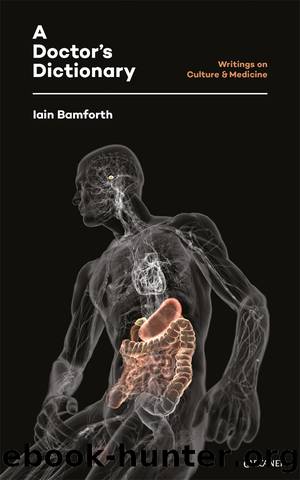A Doctor's Dictionary by Iain Bamforth

Author:Iain Bamforth
Language: eng
Format: epub
ISBN: 9781784100575
Publisher: Carcanet
The Importance of being an Agoraphobe
THE WRITINGS OF PETR SKRABANEK
Petr Skrabanek (1940–94) was one of the few really distinctive voices in post-war medicine: a polymath, world authority on substance P (a neurotransmitter) and Joyce scholar who ran yearly seminars on Finnegans Wake. He was on a visit to Yeats’ grave in Sligo in 1968 when the Soviet army invaded Czechoslovakia. He and his future wife decided to stay in Ireland, and he completed his medical studies there in 1970. So began his mature career as ‘natural scientist, forensic toxicologist, doctor of medicine and connoisseur of the absurd’, and it culminated in an associate professorship at Trinity College. Skrabanek was a dissenter, fearless in his criticism of what he dubbed ‘cacademics’, ‘quackupuncturists’ and ‘nonsensus-consensus’. The title of his best known book, Follies and Fallacies in Medicine, speaks for itself.
At last, someone has had the sense to bring out a selection of his several hundred published essays. This selection of sixteen of them gives a keen sense of the distinctive, witty manner in which he applied an ‘attitude of mind rather than a philosophy’: topics include electro-convulsive therapy, acupuncture, psychiatric nosology, anti-smoking campaigns and a brilliant Socratic dialogue defending ‘destructive’ criticism. (‘All criticism welcome provided it is constructive’, was the message I received from a journal editor the other day, in a perhaps only partly conscious attempt to defang criticism of its very raison d’être.) Skrabanek was anything but a rationalist by rote or bulk purchase. Overneat conceptual rationalisations are among his choice targets: Freud’s and others’ bespoke therapies write themselves off as science precisely because of their snap-shut snugness, the responsibility of the true scientist being to strive to find ways of proving himself wrong. ‘By choosing unbelief’, Skrabanek wrote in False Premises, False Promises, ‘we do not rule out a subsequent change of opinion, based on new evidence, and thus nothing is lost; whereas, by being gullible, we lose reason from the very beginning.’ Criticism is really the quickest way to learn. Whetted by Hume and Popper, his native wit is jugulating: ‘Iconoclasm has no place in science because science has nothing to venerate.’ Nor, he might have added, can its results be settled by plebiscite, or even by experts.
Medicine is a different matter, especially now that its methods of caring for the sick are overlaid with all sorts of socio-cultural agendas and quasi-religious expectations. It aspires to be a science though it is guided by notions of orthodoxy and heresy. As a social utility, it is ruled by conceptions of the summum bonum that are outside the remit of science: scientific method disregards issues of good and evil, indeed is successful as a method insofar as it does so, and therefore cannot be used as a moral guide. Unfortunately, doctors undergo a crammed, often dogmatic training in thrall to clinical ‘bosses’, which tends to hinder critical thinking. Then one fine day they wake up to find themselves as soteriological salesmen in the Valley of the Shadow of Death. And they hate to lose face by admitting they don’t know.
Download
This site does not store any files on its server. We only index and link to content provided by other sites. Please contact the content providers to delete copyright contents if any and email us, we'll remove relevant links or contents immediately.
| Administration & Medicine Economics | Allied Health Professions |
| Basic Sciences | Dentistry |
| History | Medical Informatics |
| Medicine | Nursing |
| Pharmacology | Psychology |
| Research | Veterinary Medicine |
Periodization Training for Sports by Tudor Bompa(8272)
Why We Sleep: Unlocking the Power of Sleep and Dreams by Matthew Walker(6725)
Paper Towns by Green John(5191)
The Immortal Life of Henrietta Lacks by Rebecca Skloot(4588)
The Sports Rules Book by Human Kinetics(4386)
Dynamic Alignment Through Imagery by Eric Franklin(4217)
ACSM's Complete Guide to Fitness & Health by ACSM(4060)
Kaplan MCAT Organic Chemistry Review: Created for MCAT 2015 (Kaplan Test Prep) by Kaplan(4012)
Livewired by David Eagleman(3774)
Introduction to Kinesiology by Shirl J. Hoffman(3770)
The Death of the Heart by Elizabeth Bowen(3622)
The River of Consciousness by Oliver Sacks(3604)
Alchemy and Alchemists by C. J. S. Thompson(3521)
Bad Pharma by Ben Goldacre(3428)
Descartes' Error by Antonio Damasio(3279)
The Emperor of All Maladies: A Biography of Cancer by Siddhartha Mukherjee(3163)
The Gene: An Intimate History by Siddhartha Mukherjee(3098)
The Fate of Rome: Climate, Disease, and the End of an Empire (The Princeton History of the Ancient World) by Kyle Harper(3067)
Kaplan MCAT Behavioral Sciences Review: Created for MCAT 2015 (Kaplan Test Prep) by Kaplan(2986)
